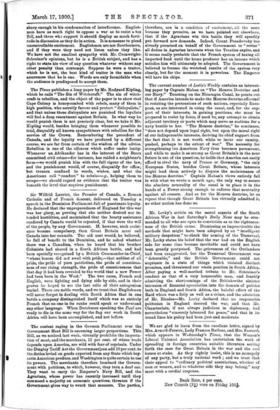The Times publishes a long paper by Mr. Rudyard Kipling,
which he calls "The Sin of Witchcraft." The sin of witch- craft is rebellion, and the object of the paper is to show that Cape Colony is honeycombed with rebels, many of them in high position, who secretly favour and protect " disloyalists," and that unless these disloyalists are punished the loyalists will feel a deep resentment against Britain. In what way be would punish them is not precisely clear, but we take it Mr. Kipling would, besides bringing them whenever possible to trial, disqualify all known sympathisers with rebellion for the service of the Crown. Remembering the precedent of Canada, and the loyalty we have produced by a different course, we are far from certain of the wisdom of the advice. Rebellion is one of the offences which suffer under lenity. Whenever an Afrikander has in the interest of the Boers committed civil crime—for instance, has raided a neighbour's farm—we would punish him with the fall rigour of the law, and the punishment would, of course, disqualify for office; but treason confined to words, wishes, and what the Americans call " comfort " to rebels—e.g., helping them to escape—we should regard as evidence that the traitor was beneath the level that requires punishment.
































 Previous page
Previous page